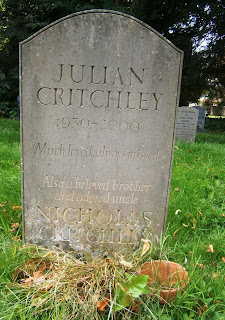 A week before Christmas I blogged about the BBC programme The Golden Age of Railways. Joseph Boughey, who appeared in that programme, left a comment on that post.
A week before Christmas I blogged about the BBC programme The Golden Age of Railways. Joseph Boughey, who appeared in that programme, left a comment on that post.
Now Joseph has written a guest post on the uncertain politics of railway preservation and the relation of the 'small is beautiful' theme to wider political aspirations and economic arrangements.
During the film
The Golden Age of Steam: Small is Beautiful I explained some of my impressions of those who, in 1950, founded the Talyllyn Railway Preservation Society (not its present members, or members of similar societies).
Of course, much was said that did not appear in the film. The outlook of the Talyllyn founders was conservative rather than Conservative, and indeed only one founder – William Trinder – had a clear party identification, and he was a Liberal. This facilitated his dealings with the line’s owner, Sir Henry Haydn Jones, who was Liberal MP for Merioneth.
On the whole, support for small railway preservation has never been linked to direct party advantage. It could appeal to figures on the Left like Bob Cryer MP, supporter of the Keighley & Worth Valley Railway Company, who saw it as a form of common ownership under workers control; or Sir Gerald Nabarro, maverick Conservative MP, who sought to take over the Severn Valley Railway and demonstrate the virtues of private enterprise. As Raphael Samuel asserted in
Theatres of Memory, 'heritage' (itself a much-contested concept) has proved unusually capable of attracting wide-ranging support quite separately from party interest.
Quite apart from party involvement, many who are involved in railway preservation would see this as quite separate from politics, and would repudiate any political connections. There are, however, distinct political dimensions to preservation, conservation and heritage, albeit ones that cannot be reduced to conventional party stances. Preserved railways correspond to a stress on the small-scale, the personal and intimate, in contrast to the large-scale impersonal bureaucracies represented by corporate capital.
By a modest leap, the 'small is beautiful' approach to organisation can be extended to forms of politics, notably a Green emphasis on local control and the small-scale, and some aspects of 'community politics' fostered by the 1970s Liberal revival. The Green movement has also encouraged many to eschew formal party involvement for attempts to develop small-scale alternatives, experiments that might spread to counter and replace the mainstream. The Centre for Alternative Technology, founded in 1975 to foster and generalise ecological alternatives, represents one such smaller-scale institution.
In the 1970s, community politics, seen as “a system of ideas for social transformation”, seemed to offer an alternative to unfettered corporate capitalism or bureaucratic monocultural social democracy. I recall a Radical Bulletin activist asserting that “participation is an end in itself” in 1975 (Guardian, 20 September), spreading the idea of popular involvement well beyond parties into the wider economy. Somehow, given wide participation, better decisions, better policies, indeed a better world, would emerge. If this now seems a bizarre idea for the party of Nick Clegg and David Laws, this remains an ideal that seems to lie behind some initiatives and some organisations of economic or political purpose.
It is tempting to view the Talyllyn and other enthusiast-run railways in this light, as a more appropriate way to proceed than the large-scale nationalised railway or the corporate state-regulated system represented by the privatised railway. And yet, organisationally, while small-scale may be good for a local leisure attraction supported by enthusiasts, it is hardly the way to run a railroad, let alone to develop new infrastructure.
Those who founded the Talyllyn seemed to hark back to an era before the Big Four companies produced by Grouping, which, apparently, featured a more human scale. The hierarchical nature of such companies, often run by autocrats, was not stressed. Trinder had initially hoped that a former railway director, expropriated through nationalisation, could be persuaded to take over the line, and the model of small-scale local management, which would be followed later by many preserved lines, only emerged when such railway 'enthusiasts' proved uninterested.
If the Talyllyn founders regarded nationalisation as a threat to the human-scale, there was also an attempt to turn back the clock to a somewhat romanticised vision of a countryside that was yet to be marred by industrialisation, in a post-war world in which the modernisation associated with social democracy seemed to threaten landscapes and “traditional” ways of life.
L.T.C Rolt’s writings, in particular, were later claimed by parts of the Green movement, although his views were closer to the interwar organic movement (of “blood and soil”) than the politics of Caroline Lucas. He saw the Talyllyn as somehow accessing surviving remnants of a pre-industrial natural order, in which contradictions between people and environment were not manifest; he had earlier made a similar case for Britain’s smaller canals. Rolt made the leap of imagination to praise both a settled mediaeval order and the apparent esprit de corps of pre-Grouping railway companies.
This comes close to the derided 'hobbit socialism', advocating a settled order that had eschewed industrialism, something that The Shire was threatened by in Tolkien’s book, until his heroes returned and restored an agrarian society. This romanticised vision had resonances with the right-wing nationalism espoused by Saunders Lewis, the co-founder of Plaid Cymru, who wanted to deindustrialise the South Wales valleys (something with which Plaid’s current leader, who is decidedly left wing and comes from the Rhondda, might take issue!). Some movements that seek to promote the local in opposition to the global or large-scale can be distinctly ultra-reactionary – orcs rather than hobbits.
The appeal of the small scale can be seductive. I fully agree with the assertion that “The ultimate obscenity is to reduce people to the status of objects: to be led, manipulated, directed, discarded.” (ALC Campaign Booklet,
The Theory and Practice of Community Politics, 1980). However, the problem is how to secure a political environment in which all people count.
What is crucial is the broader polity and economic system, in which the small-scale are embedded. Small organisations, whether self-managed enterprises, consumer co-operatives, social enterprises or co-owned organisations or property might well prove to feature in the good society. However, on their own they do not provide more than a miniature bulwark against the impersonal forces of capitalist economies and corresponding states; and without challenges to established ownership of capital, community involvement, participation and (frankly) control must remain marginal or utopian.


















